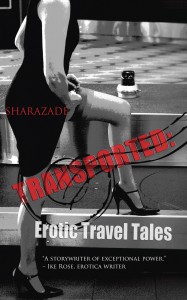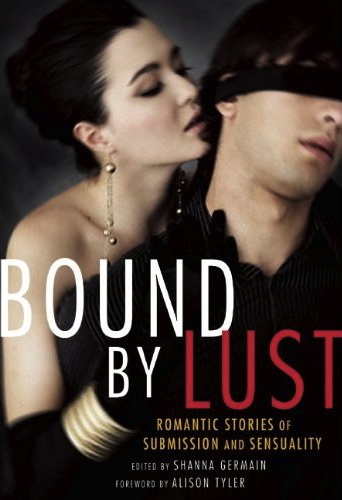
This was a hard book for me to pick up. I mean that literally, because I lost it for a few weeks — in my own house. It arrived in December, with its attractive cover and enticing contents, just a few days before my conservative parents arrived for the holidays. I tucked it into a concealing brown fabric cover and tucked it unobtrusively, spine inwards, into a shelf of books somewhere. Somewhere. But I have a lot of books in a lot of bookshelves, and upon my parents’ departure, I couldn’t find it again.
If I’m waiting for a book to arrive in the mail, I don’t really think about it until it arrives. But searching for this volume (a bit frantically, because it would be rather embarrassing to have to buy myself another copy), I found myself considering its possible contents.
I hope it doesn’t mean something bad about me that I was thinking about what I didn’t want. For one thing, I didn’t want to read about bondage practices that were distractingly unsafe or unrealistic. Master Marchand looped the rope around his slave’s neck, tightened the slipknot, and then tossed the other end of the lasso around the horn of his nervous stallion’s saddle. No, that wouldn’t do. But neither did I want a safety lecture: Having earned his EMT license, Lester carefully adjusted the wide flat strap against Felicity’s skin. “Notice how I can slip two fingers under the bond, assuring me that circulation is not cut off?” he asked the paramedic watching in the corner. I also didn’t want a how-to demo: Domme Dominique leaned in and breathed into Sam’s ear, “Now, the right end of the rope is a good three inches longer than the left. I take that right end in my hand, and then the rabbit goes around the tree, down the hole…”
Oh, joy! There was the book, sandwiched between Tahar Ben Jelloun’s L’Enfant de sable and L’Écrivain publique. I guess I’d figured my parents weren’t going to be poking around that shelf since they don’t speak French.
I know you probably saw this line coming from the beginning, but I’m going to say it anyway: a hard book to pick up, but then a hard one to put down. One nice thing about short stories is that you can read them one at a time, so if you only have a few moments you can still slip a little reading in — which is what I had been intending to do, actually, but I wound up reading it in three sittings. Oh well! The stories are all good enough to go back and re-read, so I will still be able to stretch it out.
This volume contains 20 short stories, all linked by the theme of bondage. Not a medium-quality story in the whole lot. Truly. This is an excellent collection. I had my favorites, sure (and not necessarily the ones I would have predicted if I’d read a summary first), but every single one was good. What I especially liked was the level of insight in each story. They’re not how-to manuals; they’re more how-it-feels and why-I’d-want-this stories, and they felt true to me. And they are, above all, stories, with plots and compelling characters and settings you can picture.
If I fully reviewed all 20 stories, my parents would be back again before I could finish, so I’ll just give a few sentences about each one and some representative phrases.
The Long Way Home, Elizabeth Coldwell. This was one of my favorites. A great premise, and extra credit for descriptions with just the right amount of details: a laburnum tree; a nonchalant click. Very hot and and very loving, two qualities I especially appreciate in erotica.
His Little Apprentice, Jacqueline Applebee. Usually stories have the dominant partner the more experienced, so this was a nice twist, where the person to be bound lures the … binder? bondager? guy-who-does-the-tying, whatever he’s called. “Mine.” Yeah, that says it all.
Foreign Exchange, Evan Mora. I loved the concept behind this title — first of all, it’s about a Canadian couple in New York; sometimes culture shock is the stronger for being unexpected (as when you move from one country to another that you think is quite similar); then this couple meets another with different ways. It’s the way she says it: that perfect tone that implies my permission is not being sought and that compels my immediate compliance.
The Ingénue, Janine Ashbless. A historical! (At least, that’s how it read to me.) She wanted to prick the bladder of his arrogance… Many books and sites on writing bang on and on about the need for a punchy, clever beginning, but I have a weakness for a strong ending, like this story had.
Reasoning, Tenille Brown. The point was, Ray was trying to fuck her to death. This story was such fun. The only way the heroine could get her guy to shut up and listen was to force him. So, Carlotta had said “No,” just like that, and it hadn’t really felt bad at all. It had felt damned good, in fact.
Subdue, Dusty Horn. Another favorite. Fantastic descriptions (rich even alto; morsels of orders), hot lines (“This is not your collar. It’s mine, for you to wear.”), and, as I mentioned above, insights into the mind of the person submitting (“I don’t always know how to be good.” / “I guess I just don’t want to go down without a fight.”).
Relative Anonymity, Emerald. An ex-husband who parted on good terms returns — with a surprise. At that moment, she would have sworn he had just watched the same movie of their lives together with her, some connection in their look allowing them to share the same memory.
Closeted, Emily Bingham. What really goes through the mind of a submissive being punished? …I’m supposed to be thinking about something important while I’m in here. Like the true nature of my submission. Screw that, I’m going to piss in his closet — that will show him. Yeah, but later, she gets hers: Apparently, I am a whore and loving it.
Vegas Treat, Rachel Kramer Bussel. A nice treatment of a girl’s first time being tied; not the innocent who needs to be pressured, but a natural who just needed the opportunity: I wasn’t a virgin, or anything, obviously, but maybe I’d been meeting the wrong men because none had ever proposed so much as a threesome, let alone bondage and sex toys. I loved this sentence: His voice was so sensual, so smoky and intense, the aural equivalent of rich Texas barbecue, that I melted into it the way barbecue melts on my tongue.
The Cartographer, Angela Caperton. This one blew me away. I actually teared up a little in the middle of reading it. The man is tattooing a map onto his lover’s body; but what will he do when his canvas is completed? From the opening: My body is a map. The continents are accurate and bold, the oceans pale peach. Arching shoals rise in the curves of flesh, and muscles cradle the gentle bend of bay shores. Beautiful, throughout.
The Apiary, Megan Butcher. I want her to spin a story, a fairy tale of our time together, not this story with no happy ending. Sweet and deep, a look at how a couple recovers from an encounter gone wrong.
Wired, Lisabet Sarai. Geek love! Computers and online shenanigans and a “mysterious foreigner” programmer. A timely update on the “office sex” theme. I rocked back and forth on Krishna’s ergonomic chair… I liked too the willingness of the protagonist to try whatever her crush was into. It’s hot if the object of your desire finds it hot.
How the Little Mermaid Got Her Tail Back, Andrea Dale. You know the original story, right, not just the Disney version — the mermaid trades her tail for legs, so that she can live on land with the man she loves, but she must also give up her voice; and because she can’t talk to him, he falls for another, and as her penalty for not winning his love, she dies (or becomes sea foam, in gentler versions). Not exactly my idea of a happy ending. Finally! A story to put things right again. She teetered on the knife edge of honesty and terror, and that’s what made her come so hard, time after time.
The Lady or the Tiger, Bill Kte’pi. A nod to the classic Frank Stockton short story. “Our only choice is to stride through the door with dignity.”
Sealed for Freshness, Jennifer Peters. One of the few stories told from the Dominant’s point of view. For a moment I contemplated berating him for the obvious show of pleasure, but I knew his punishment would teach him a lesson, even if he happened to enjoy parts of it a little too much.
Stocks and Bonds, Rita Winchester. No, not that kind of stocks, the other kind; you know, like from historical Williamsburg. Roleplaying after a Renaissance Festival. He knows I love the dirty words. Whore and slut and trollop: all of them, they make me crazy and wet. Just plain fun, this one.
Helen Lay Bound, Suzanne V. Slate. The contrast of an old-fashioned corset, laced tight, under regular clothes. For school we dress in what we call “academic drag”: jeans, boots, thick baggy sweaters. The corset is our secret. A long, sensual tease, with historical and philosophical reflections on bondage.
The Rainmaker, Elizabeth Daniels. Hope brought Amy to her knees, head bowed, cuffed hands outstretched. … After five months of sexual drought, there wasn’t anything she wouldn’t do for an orgasm. A couple deals ingeniously with one partner’s loss of sexual desire.
Do You See What I Feel? Teresa Noelle Roberts. My husband is evil and perverted and I love him for it. And he’s set up a literal blind date for his wife.
Truss Issues, Lux Zakari. And trust issues as well. “I guess I’ve seen too many instances where people have put their faith in the wrong lovers.” Isn’t that one of the ultimate fantasies? Someone who knows you better than you know yourself — and uses that knowledge for good.
If you don’t have young children in the house, and you’re quite sure my parents aren’t planning to visit you, you might want to display this handsome book on your shelf. The paper copy can be bought here. For the more discreet, there’s a Kindle edition. Or, like me, you can take the middle road, and get a paper copy that you disguise. Just don’t forget where you put it.
* * * * *








